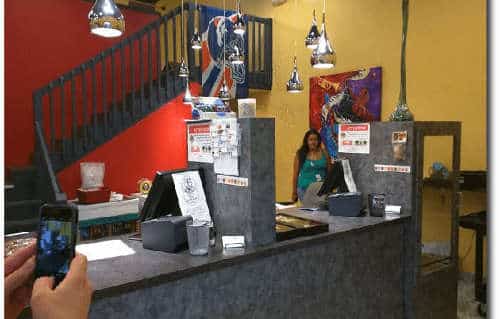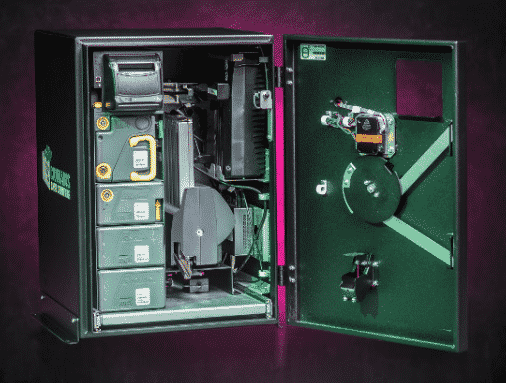
As marijuana legalization continues to spread, the marijuana kiosk is helping to simplify and secure the sales process.
By Richard Slawsky contributor
Just two years into the state’s experiment in the legalization of marijuana for recreational use, Colorado businesses are on track see more than $1.3 billion in revenue from the sale of weed and related products. That’s a whopping 30 percent higher than the $1 billion those businesses took in last year.
Those results are similar to what’s being seen in Washington, the second state to go 420-friendly. Washington reached the $1 billion mark in July 2016, just 12 months after the first legal sale of recreational pot.
And that growth is sure to continue, especially as more and more states hop aboard the cannabis train.
But as with any business, a growing customer base brings with it an opportunity to serve those customers with technology. Cannabis and kiosks are proving to be a perfect match.
Growing like a weed
With the results of November’s election, the use of both recreational and medicinal marijuana has been entirely legalized in eight states, with medical marijuana legal in 28 states.
While the approach of the incoming administration in regards to legalized marijuana remains to be seen, it’s likely that the movement has passed the point of no return.
Still, there are some sticky issues associated with the sale of marijuana. First and foremost is that despite it being legal at the state level, federal law still considers marijuana to be a Schedule 1 drug, putting it on the same level with heroin, LSD and ecstasy.
Because federal law prohibits financial institutions from processing payments from the sale of a Schedule 1 drug, for the most part the cannabis industry is an all-cash affair. Credit and debit card transactions just aren’t allowed.
Unfortunately, conducting business on an all-cash basis is fraught with risk. First and foremost is that having large amounts of cash on the premises makes a marijuana business a prime target for a robbery.
In June 2016, for example, a security guard at a suburban Denver dispensary was shot and killed during a robbery attempt. The killing of the guard, former Marine Travis Mason, was the first known on-the-job death at a licensed marijuana business in Colorado.
The same month, a medical marijuana dispensary owner in the Los Angeles area survived a shootout with two would-be robbers wearing masks and armored vests. The owner escaped unharmed, although the robbers were wounded when the owner fired his own weapon.
In addition to the outside threat, dispensary owners also face the potential of internal theft. Despite the amount of money flowing into the pot industry, dispensary workers start at or near the minimum wage. Handling thousands of dollars a day while taking home $10-12 an hour is likely to prove to be an overwhelming temptation for some seeking to supplement their income.
And that’s where the kiosk industry can help.
Fresno, Calif.-based Cannabis Cash Solutions, for example, is providing cash-handling kiosks for marijuana dispensaries that eliminate the need for employees to handle money. In addition, the devices store the cash in a secure vault until pickup by a manager or an armored car service
“What we’re doing with the kiosks is taking the money straight from the customer’s hands and putting it right into the vaults in our kiosks,” said Cannabis Cash Solutions CEO Andrew Savala. “The marijuana business doesn’t touch the cash at all.”
With Cannabis Cash Solutions kiosks, customers come up to the dispensary counter and interact with the dispensary’s “budtender,” who explains the different product choices available. Once the customer has made their choice the budtender directs them to the counter-mounted kiosk, where they insert their cash payment into a bill acceptor and receive their change. The kiosk recycles the cash inserted for use as change, minimizing the need for replenishing the change fund.
“Customers are still able to have that one-one-one interaction with the budtender,” Savala said. “The budtender can still spend as much time with them as they need answering the customer’s questions, they just don’t handle the cash.”
[Video demo of automated cashier]
Malvern Pennsylvania-based Crane Payment Innovations provides the cash recyclers and coin dispensers in these kiosks.
“It seems to be quite an up-and-coming market,” said Bassam Estaitieh, director of business development – acquisitions with CPI.
See related story on Crane, Olea Kiosks and KioWare.
[Editor note – A total of 3.6 million vending machines will be online by 2020. CPI is the leader. Reference.]
And Denver-based ordering and payment platform provider Jane LLC has deployed its kiosks in Oregon, Nevada and Colorado, with plans to expand to California, Alaska and several other states. With Jane’s kiosks, customers can make their choice from a list of products displayed on the device’s touchscreen and pay at the kiosk. The customer then takes the receipt to the pickup counter to receive their purchase.
“We have been received with open arms in some locations, where others shut the door, priding themselves on the theory of ‘one-on-one customer experience, that’s our specialty and we don’t want to lose that.’,” said Karla Guarino, VP of Marketing/Operations with Jane LLC. “Every state has different rules and regulations which all have to be worked through. It’s an ongoing process, but an exciting one!”
Jane also offers a mobile app for iOS and Android devices. With the app, customers place an order via their mobile device and enter their order number at the kiosks when they arrive at the dispensary. Those customers are also issued a receipt to be taken to the counter.
Jane’s devices also include EMV compliant card readers that are ready to accept transactions in anticipation of the eventual legalization of credit and debit card transactions for marijuana.
“We have been working very closely with our banking partner to ensure our processes are 100% compliant and ready to accept transactions at any time,” Guarino said.
On the horizon
San Francisco-based cannabis investor network The ArcView Group predicts legal sales to top $22.8 billion by 2020, meaning the opportunities for kiosk deployments are only going to continue to expand, both in the United States and around the world. In addition, the expected growth is driving the development of new solutions for the industry.
Several companies have introduced kiosks that actually dispense marijuana, verifying customers via biometrics. Most of those efforts have struggled, though.
Tempe, Ariz.-based American Green recalled all of its Zazzz cannabis vending machines in December 2015 in response to feedback from dispensary vendors and customers, and is retooling its automated vending program.
And Los Angeles-based vending kiosk provider Medbox rebranded itself as Notis Global in February 2016, shifting its focus to cultivation, production and consulting.
Still, the technology that would be required to dispense packages of marijuana is already being used to dispense other products. There may come a time when marijuana vending kiosks are as commonplace as those renting DVDs.
“I was reading an article recently about a company deploying kiosks to dispense packages of tea,” Estaitieh said. “If a kiosk can dispense tea it could easily dispense marijuana.”
The current struggle for acceptance of those types of kiosks may be due to the fact that they have been primarily located in dispensaries. If a customer is already in a dispensary, they may be inclined to simply go to the counter and talk with a bud tender.
Depending on traffic, though, there may be a day when customers will prefer to use a kiosk for convenience. And as medical marijuana becomes more accepted around the country, pharmacies may look at those types of kiosks as a way to compete with dispensaries.
There also may be opportunities for marijuana-dispensing kiosks outside the United States as other countries seek to cash in on changing attitudes. Jamaica, for example, is in talks on a plan to install cannabis kiosks at airports and seaports as part of a plan to boost government revenues.
Jamaica decriminalized the possession of small amounts of marijuana in 2015 and has legalized the use of medical marijuana, part of a plan to market the Caribbean nation as a destination for “wellness tourism” and the accompanying flow of cash.
“The thought is that if you are coming out of the airport, there is a kiosk that you can go to,” Cannabis Licensing Authority (CLA) Chairman Hyacinth Lightbourne told the Jamaican publication The Gleaner.
“It would primarily be for people who have a prescription and, in effect, you’re doing it for medicinal purposes with a permit from the Ministry of Health,” Lightbourne said. “If they don’t have a prescription, then they can do what we call ‘self-declare,’ and this will allow them [to purchase] two ounces while they are here.”
Marijuana Kiosk More information
How the payments industry came to accept marijuana – from Payments Source. Excerpt:
Despite this progress, most financial services providers still see compliance as a hurdle. Only about 300 of the more than 11,000 banks currently operating in the U.S. work with legal pot vendors.
“Paradoxically, most of the institutions nationwide that offer business to marijuana suppliers are small and very unhealthy; most are the ones desperate for income,” said Lamine Zarrad, founder and CEO of Tokken, a Denver-based blockchain startup.
Tokken sees the marijuana industry’s situation as comparable to other industries, and thus it can apply solutions that other markets use. Tokken uses bitcoin blockchain to peg marijuana transaction information to its blockchain so that banks and regulators have an immutable, time-stamped record. Information about each transaction is hashed and input on the bitcoin blockchain. In this way consumers, businesses, banks, regulators and law enforcement agencies can view the system and ensure there’s no tampering, Zarrad said.
Related posts onsite

